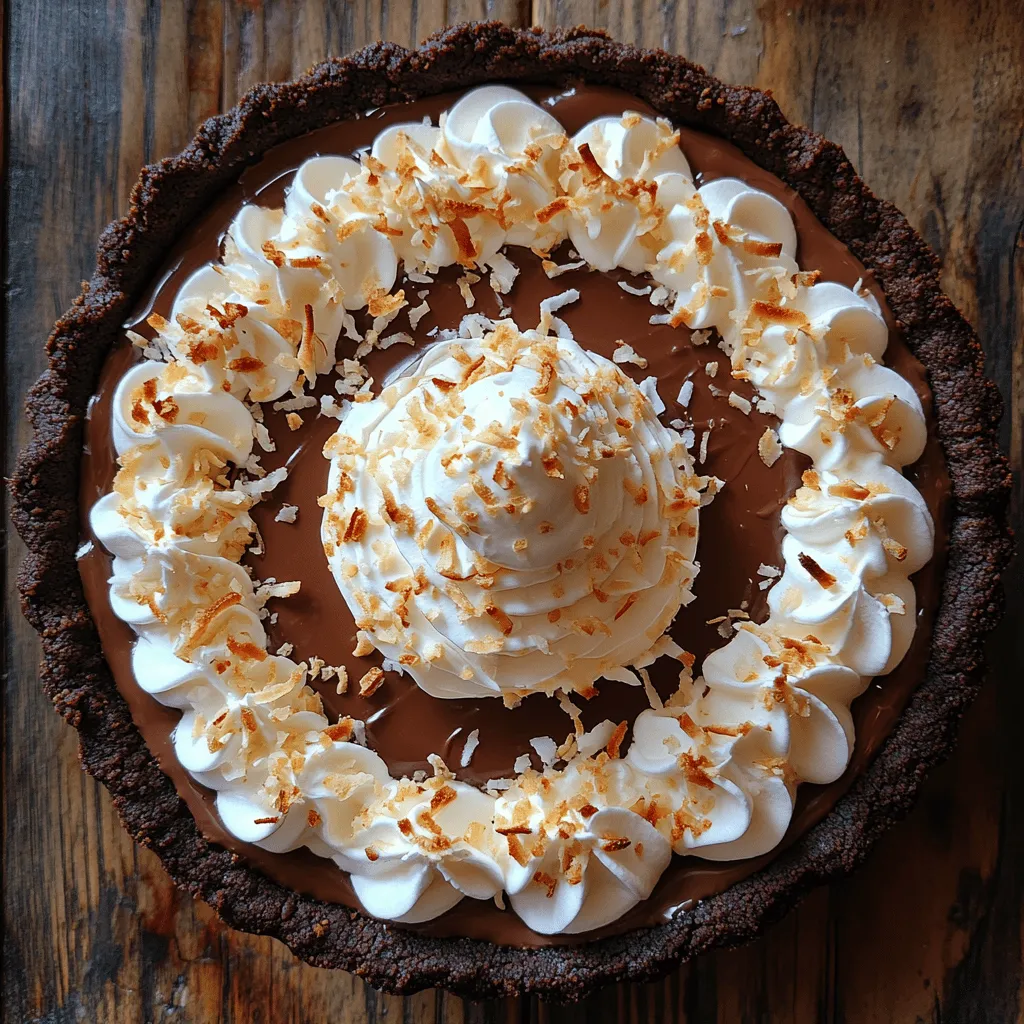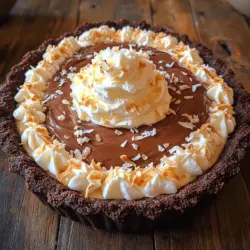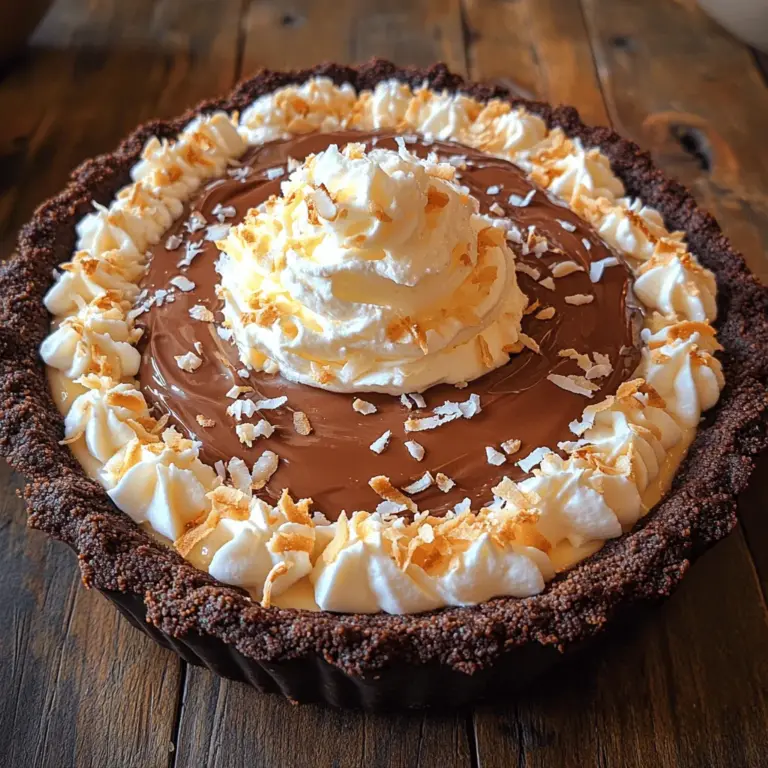Introduction
There’s something undeniably mesmerizing about the combination of chocolate and coconut. These two flavors, when paired together, create a rich and indulgent experience that captivates the senses. Chocolate’s deep, velvety sweetness beautifully complements coconut’s light, tropical notes, making it a favorite in desserts worldwide. Among the various confections that celebrate this delightful duo, the Heavenly Chocolate Coconut Cream Pie stands out as an exceptional treat, perfect for those who crave a slice of bliss.
This decadent dessert is not just a feast for the taste buds; it also boasts a stunning presentation that makes it an ideal centerpiece for any gathering. Whether you’re hosting a holiday dinner, celebrating a birthday, or enjoying a casual afternoon with friends, this pie is versatile enough to suit a range of occasions. Its creamy filling and rich chocolate crust promise to impress your guests and leave them asking for seconds.
In this article, we’ll take a closer look at the ingredients that make this pie a true indulgence, guide you through the crafting of the chocolate crust, and help you create a luscious coconut cream filling. Let’s embark on a culinary journey that will elevate your dessert game with this heavenly pie.
Understanding the Ingredients
The Allure of Chocolate Cookie Crumbs for the Crust
The foundation of any great pie begins with its crust, and for our Heavenly Chocolate Coconut Cream Pie, we turn to the irresistible flavor of chocolate cookie crumbs. The use of chocolate cookies, such as Oreos, creates a crust that is not only delicious but also adds a delightful crunch. This crust serves as the perfect contrast to the smooth and creamy filling that will follow.
When crafting a chocolate crust, the texture and flavor profile are paramount. The crumbs should be finely ground to ensure an even distribution and firm structure. The sweetness from the cookies enhances the overall taste, making the crust a standout component of the dessert.
Alternatives to Chocolate Cookie Crumbs
While chocolate cookie crumbs are a fantastic choice, there are alternatives for those who may prefer a different flavor profile or dietary considerations. For instance, using graham cracker crumbs can yield a lighter, less intense crust that still complements the rich filling. You may also experiment with gluten-free cookie options, allowing everyone to enjoy this delightful pie.
The Role of Coconut Milk in the Filling
Coconut milk is a key ingredient in the filling of our Heavenly Chocolate Coconut Cream Pie. This creamy liquid brings a luxurious texture to the pie, while also infusing it with a subtle coconut flavor that elevates the dish. When selecting coconut milk, opting for full-fat versions is essential. The higher fat content not only enhances the creaminess but also contributes to the pie’s overall richness.
Benefits of Using Full-Fat Coconut Milk
Full-fat coconut milk is packed with flavor and provides a satisfying mouthfeel that low-fat alternatives simply cannot match. The richness of full-fat coconut milk ensures that the filling is luscious and indulgent. For those who may have lactose intolerance or are following a vegan lifestyle, coconut milk serves as an excellent non-dairy alternative to traditional dairy products.
Comparison with Other Dairy and Non-Dairy Options
While coconut milk shines in this recipe, it’s worth mentioning other options for those who may want to experiment. Heavy cream is another popular choice for creating a creamy filling, but it does contain dairy, which may not suit everyone. Almond milk, cashew cream, or oat milk can serve as non-dairy alternatives; however, they may not yield the same level of creaminess or flavor as coconut milk.
Heavy Cream: A Key Player in the Creaminess
In addition to coconut milk, we’ll also be using heavy cream in our coconut cream filling. Heavy cream contributes to the decadent texture of the pie, ensuring it remains rich and smooth. The fat content in heavy cream is crucial; it allows for the perfect balance of creaminess and stability in the filling.
Discussion on the Importance of Fat Content in Achieving the Right Texture
The fat content in both coconut milk and heavy cream plays a vital role in the success of the filling. Fats help emulsify the mixture, creating a smooth and cohesive consistency. When preparing the filling, achieving the right balance of fat is essential for creating a pie that holds its shape without being overly dense or too loose.
Tips on Selecting the Best Heavy Cream
When choosing heavy cream, look for options that contain at least 36% milk fat. This high fat content ensures that the cream will whip up beautifully and provide the desired richness in your filling. Additionally, opt for organic or grass-fed heavy cream for a fresher flavor and more robust nutrients.
Sweetened Shredded Coconut: Adding Texture and Flavor
To enhance the coconut experience in our pie, we incorporate sweetened shredded coconut into the filling. This ingredient adds not only flavor but also texture, creating a delightful contrast to the creamy base. The shreds of coconut will provide a chewy bite that complements the smoothness of the filling.
Description of Its Contribution to the Overall Taste of the Pie
Sweetened shredded coconut brings an element of nostalgia, reminding many of tropical desserts. Its sweetness balances the richness of the chocolate and coconut filling, ensuring a well-rounded flavor profile. It also serves as a visual element, as the shreds peek through the pie, creating an inviting presentation.
Options for Substituting or Enhancing the Coconut Flavor
For those who desire a stronger coconut flavor, consider using unsweetened shredded coconut or toasting the coconut before adding it to the filling. Toasting will deepen the flavor and add a hint of nuttiness that can elevate the overall taste. Additionally, coconut extract can be used to amplify the coconut essence without altering the texture.
Crafting the Chocolate Crust
Now that we have a solid understanding of our ingredients, let’s dive into the process of crafting the chocolate crust that will serve as the base of our Heavenly Chocolate Coconut Cream Pie.
Step-by-Step Guide to Preparing the Chocolate Crust
1. Ingredients: Gather your chocolate cookie crumbs, melted butter, and a pinch of salt. The ratio typically includes about 1 ½ cups of cookie crumbs to ½ cup of melted butter.
2. Combine: In a mixing bowl, combine the chocolate cookie crumbs and melted butter. Mix until the crumbs are evenly coated, resembling wet sand. The melted butter acts as a binding agent, ensuring that the crust holds together once baked.
3. Add Salt: A pinch of salt enhances the chocolate flavor, balancing the sweetness of the cookies. Be sure to incorporate it well into the mixture.
Importance of Precise Measurements
Getting the measurements right is crucial when making the crust. Too much butter can lead to a greasy crust, while too little can result in a crumbly base that doesn’t hold together. Use measuring cups for accuracy, and don’t hesitate to double-check your amounts.
Techniques for Pressing the Crust Evenly
Once the mixture is combined, transfer it to a pie pan. Use the back of a measuring cup or your fingers to press the crumb mixture firmly and evenly across the bottom and up the sides of the pan. This method ensures that the crust is uniform in thickness and will bake evenly.
Baking Tips for Achieving the Perfect Crust
Preheat your oven to 350°F (175°C). Once your crust is pressed into the pan, place it in the oven and bake for about 8-10 minutes. This step is essential for setting the crust and enhancing the flavors.
Ideal Baking Time and Temperature
The ideal baking time will depend on your oven, but keep an eye on the crust as it bakes. You’re looking for a slightly firm crust that holds its shape when cooled. The edges should be crisp, and the chocolate aroma will fill your kitchen, indicating that it’s almost ready.
Signs That the Crust Is Ready
The crust is done when it appears set and slightly darker in color. Allow it to cool completely before adding the filling, as a warm crust can cause the filling to become runny.
Creating the Coconut Cream Filling
With our chocolate crust prepared, it’s time to create the luscious coconut cream filling that will bring our pie to life.
Detailed Instructions for Making the Filling
1. Combine Ingredients: In a medium saucepan, combine coconut milk, heavy cream, sugar, and a pinch of salt. Whisk the ingredients together until well combined.
2. Heat the Mixture: Place the saucepan over medium heat, stirring frequently to prevent the mixture from sticking to the bottom. Heat until it begins to steam, but do not let it boil.
3. Add Cornstarch: In a separate bowl, whisk together cornstarch with a few tablespoons of cold water to create a slurry. This step is crucial for ensuring that the cornstarch dissolves completely and prevents clumping.
4. Incorporate the Slurry: Once the coconut mixture is steaming, gradually add the cornstarch slurry while whisking continuously. This action will help thicken the filling as it cooks.
Importance of Mixing and Cooking Techniques
Proper mixing and cooking techniques are essential for a successful coconut cream filling. Whisking continuously while adding the slurry ensures a smooth texture, while heating the mixture allows the cornstarch to activate and thicken properly.
Common Pitfalls to Avoid When Thickening the Filling
One common pitfall is adding the cornstarch too quickly or without mixing it with cold water first. This can lead to clumps in the filling, resulting in an undesirable texture. Always whisk the cornstarch thoroughly before adding it to the heated mixture.
The Science Behind Cornstarch as a Thickening Agent
Cornstarch works by absorbing liquid and swelling as it heats, which thickens the mixture. It’s important to bring the filling to a gentle simmer for a few minutes after adding the cornstarch to ensure it reaches its maximum thickening potential.
Explanation of How It Interacts with Liquids During Cooking
As the cornstarch granules come into contact with heat, they absorb moisture and expand, thickening the mixture. This reaction is what gives the filling its creamy consistency, allowing it to set perfectly once cooled.
Alternatives to Cornstarch for Thickening
If you prefer alternatives to cornstarch, consider using arrowroot powder or tapioca starch, both of which can achieve similar thickening results. However, keep in mind that each thickening agent may require different ratios and cooking times, so be sure to adjust accordingly.
—
Stay tuned for the rest of our Heavenly Chocolate Coconut Cream Pie recipe, where we will guide you through the final steps of assembling this delightful dessert!



